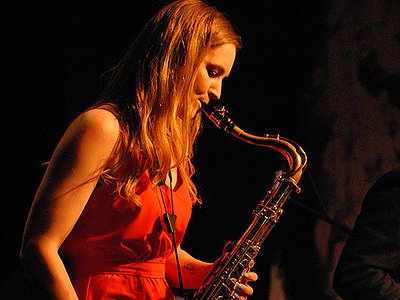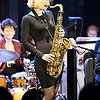What constitutes a good live performance in your opinion and what’s your approach to performing on stage? How do an improvisation and the recording of this improvisation compare?
When you see a live show, there are so many more elements that must come together and be great than just the music. In this way, a live performance has the possibility to be a bigger experience than listening to a recording. It could potentially touch someone deeper, move them more. This is why live music is such an important element in our society. The differences between a live performance and a recording are that the people listening can see you, can actually feel the vibrations of the music in their bodies. They can feel your vibrations from your mood, your demeanor. I am working on my performance skills - which I know are additional and separate skills from my musicianship. I must be good at making the audience feel welcomed, excited, inspired, and connected to what I’m doing on stage.
With a recording, it is stripped down more to just the music, so in a way it is easier to portray the core of the material, as a performer. But listening to a recording gives you a chance to get to know the music on a deeper level, as you would get to know a friend. We all have those old “friends”, albums from our childhood we listened to hundreds of times. Recording allows this relationship to the music, which is also important and unique.
Listening is also an active, rather than just a passive process. How do you see the role of the listener in the musical communication process?
The more you put into listening, the more you get out of it. Some music requires more attention than others. This is true of any element of life: people, visual arts, books, movies, etc; some require more thought than others. The greatest things in life are sometimes the things that require the most out of us. The things that we work hard at often give the greatest rewards. So in this way, music that challenges you and music that you might not catch everything the first listen through, is music that is perhaps more worth your time. Ultimately, it is up to the listener what type of relationship they desire with the music they listen to. For me, the role of the listener is great. You must commit to engage in what you listen to.
How do you see the relationship between music and other forms of art – painting, video art and cinema most importantly - and in how far, do you feel, does music relate to other senses than hearing alone?
Music has the opportunity to deepen the experience, when combined with another art form or element. As I mentioned in live performance, if music is combined with other sensations, whether it be visual, sensual, or otherwise, this only deepens the experience. Music certainly makes or breaks movies for me. Music has the potential to tell a whole story on its own, so when combined with another form of storytelling, (and if done well), it has the opportunity to make any story or concept portrayed deeper, and through more senses.
Reaching audiences usually involves reaching out to the press and possibly working with a PR company. What's your perspective on the promo system? In which way do music journalism and PR companies change the way music is perceived by the public?
I think the system currently in place is hard. For a lot of Jazz writers, for instance, they may not know the music in the same way that a musician does. So, for a writer to comment on a piece of art that they may not understand fully, can be potentially damaging. But, art is all subjective, and journalism and reviews on art have always had this inherent problem.
I have seen a lot of people in power in the music industry (especially jazz), who are either “failed” musicians, or people who truly wanted to be a musician, but didn’t see it as a real possibility for their own life. The outcome of this is also destructive, because these individuals struggle with their own feelings of inadequacy, resentment, power issues, etc. And this can cause unfair things to happen under their influence.
In a lot of ways, I find it frustrating that the music (or any art) cannot speak for itself - that it seems necessary to also be involved with “politicking” your art, to get it out there for people to experience. This is also a challenge when the art you partake in isn’t particularly lucrative, and yet these services are very costly.
In a lot of ways, it seems to be a bit of a circle jerk: in order to get a gig, you must be well known, or have other gigs, or people willing to vouch for you. But in order to get those things, people must hear you. So sometimes you can get caught in a loop and it can be hard to find an armhole to begin opportunity.
But, there are those people in the promo industry, who truly love what they do, and they are the helpers - the people who help the music thrive and survive. These individuals are part of a necessary community that come together as a whole to make the organism called music healthy and prosperous.
Putting efforts into the music industry, and the PR system, etc, is just as necessary a part of being a musician, as working on your craft. Because if no one ever hears what you create, what good is that? The goal is to be at a point in your career where you can work with a team of other people, who are great at what they do, to worry about that side of things, so you can focus solely on your job - being an artist.
Do you have a musical vision that you haven't been able to realise for technical or financial reasons – or an idea of what music itself could be beyond its current form?
There’s always a struggle to find time to explore all of my ideas, and part of this struggle is financial, of course. I have to make a living, and that takes time. Also, it’s hard enough to book one band, and get momentum for one project, so I tend to try to stick with one for now, to attempt to gain some momentum and acknowledgment. There are other sounds I’d like to explore, and am beginning to, but I may not be able to see these come to fruition until I have more momentum in what I’m already doing. My life journey and goal as an artist and musician in general is to find and create music beyond its current form, so that is certainly my focus.




